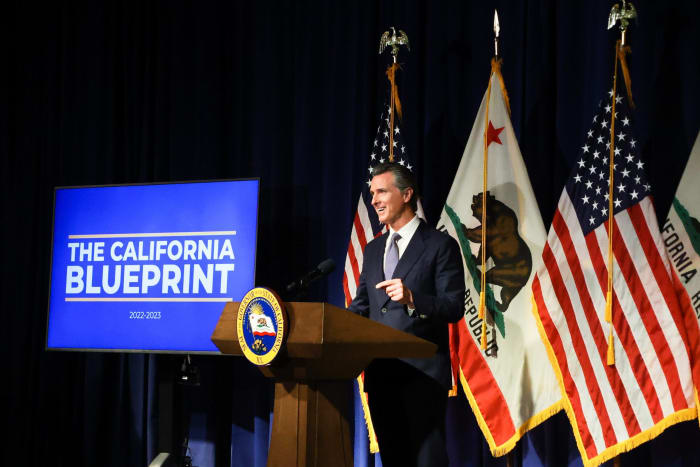
TL;DR: California faces a $32B budget deficit due to inflation and delayed taxes. Newsom's proposal includes spending cuts and borrowing. Democrats put forward alternatives. Protecting healthcare and education is a priority.
- California is facing a significant budget deficit of nearly $32 billion, resulting from high inflation and delayed tax filings due to winter storms.
- Governor Newsom's budget proposal includes measures such as spending cuts, expense shifting, drawing from reserves, and borrowing to address the deficit.
- There are criticisms and alternative proposals from Republican and Democratic lawmakers, highlighting debates over responsible spending and resource allocation.
- Successfully addressing the budget could build political credit for the governor as a presidential candidate.
California, the most populous state in the nation, finds itself grappling with a substantial budget deficit that has surpassed initial estimates, reaching nearly $32 billion.
This deficit has been fueled by a combination of factors, including high inflation and the delayed tax filings resulting from winter storms.
In this in-depth analysis, we delve into the intricacies of California's budget deficit, examining Governor Newsom's proposals to address the fiscal challenge, while also exploring the criticisms and alternative proposals put forth by lawmakers from different political affiliations.
Furthermore, we examine the hurdles faced by policymakers as they navigate the difficult task of making necessary budget cuts while prioritizing crucial areas of expenditure.
California faces a budget deficit of nearly $32 billion.
California's budget deficit has surged to an alarming level, now nearing $32 billion, a figure that surpasses initial predictions. The growing deficit can be attributed to the compounding effects of high inflation and the delayed tax filings caused by severe winter storms.
This financial obstacle poses a significant challenge that demands careful analysis, strategic decision-making, and swift action to restore fiscal stability.
California's progressive tax code and reliance on wealthy taxpayers.
The financial dynamics of California's budget are intricately tied to its progressive tax code, designed to levy higher tax rates on individuals with higher incomes.
This tax structure heavily relies on wealthy taxpayers, whose fortunes are closely intertwined with the performance of the stock market.
As a consequence, the state becomes susceptible to the volatile nature of stock market fluctuations, impacting tax collections and consequently widening the budget deficit.
Governor Newsom's budget proposal to address the deficit.
Governor Newsom has presented a strategy to tackle the budget deficit plaguing California. His proposal encompasses a series of measures aimed at curbing expenditure, including spending cuts, expense shifting, drawing from the state's safety net reserve, and implementing borrowing strategies. To mitigate the deficit, Newsom advocates for reductions in various programs, particularly in the realm of climate initiatives, while emphasizing the protection of priority areas such as healthcare, education, housing, and climate programs.
Criticisms and alternative proposals.
Newsom's budget proposal has faced criticisms from Republican leaders who perceive it as emblematic of irresponsible spending by the Democratic administration in Sacramento.
Republican Assembly Leader James Gallagher decried what he deemed "fiscal gimmicks" and expressed concerns over cuts in drought programs.
Conversely, Democratic lawmakers have put forward alternative proposals to challenge aspects of Newsom's plan. These include increased spending in areas such as child care, with a proposed $1 billion in funding to uplift child care workers' pay.
The challenge of budget cuts and priorities.
The process of agreeing on budget cuts and defining priorities poses a formidable challenge for policymakers.
While consensus can be elusive, there are certain areas where lawmakers find common ground. For instance, protecting funding for healthcare and education tends to garner widespread support in California.
Similarly, addressing California's housing and homelessness crisis emerges as a shared priority. Nonetheless, the complexities of negotiations, differing viewpoints, and the magnitude of the budget deficit intensify the challenges faced in this endeavor.
Governor Newsom building a national profile
California finds itself navigating the treacherous terrain of a significant budget deficit, an issue demanding urgent attention and decisive action. Governor Newsom's multifaceted budget proposal, accompanied by criticisms and alternative suggestions from lawmakers, reflects the complex landscape of fiscal decision-making.
Although Newsom has repeatedly denied any interest in running for president, he is widely seen as a potential candidate in future election cycles. A crucial aspect of this involves establishing a national presence, which he has begun by openly challenging Florida Governor Ron DeSantis. Successfully addressing the California budget deficit, even partially, would bolster his image as a capable leader deserving of the highest office.